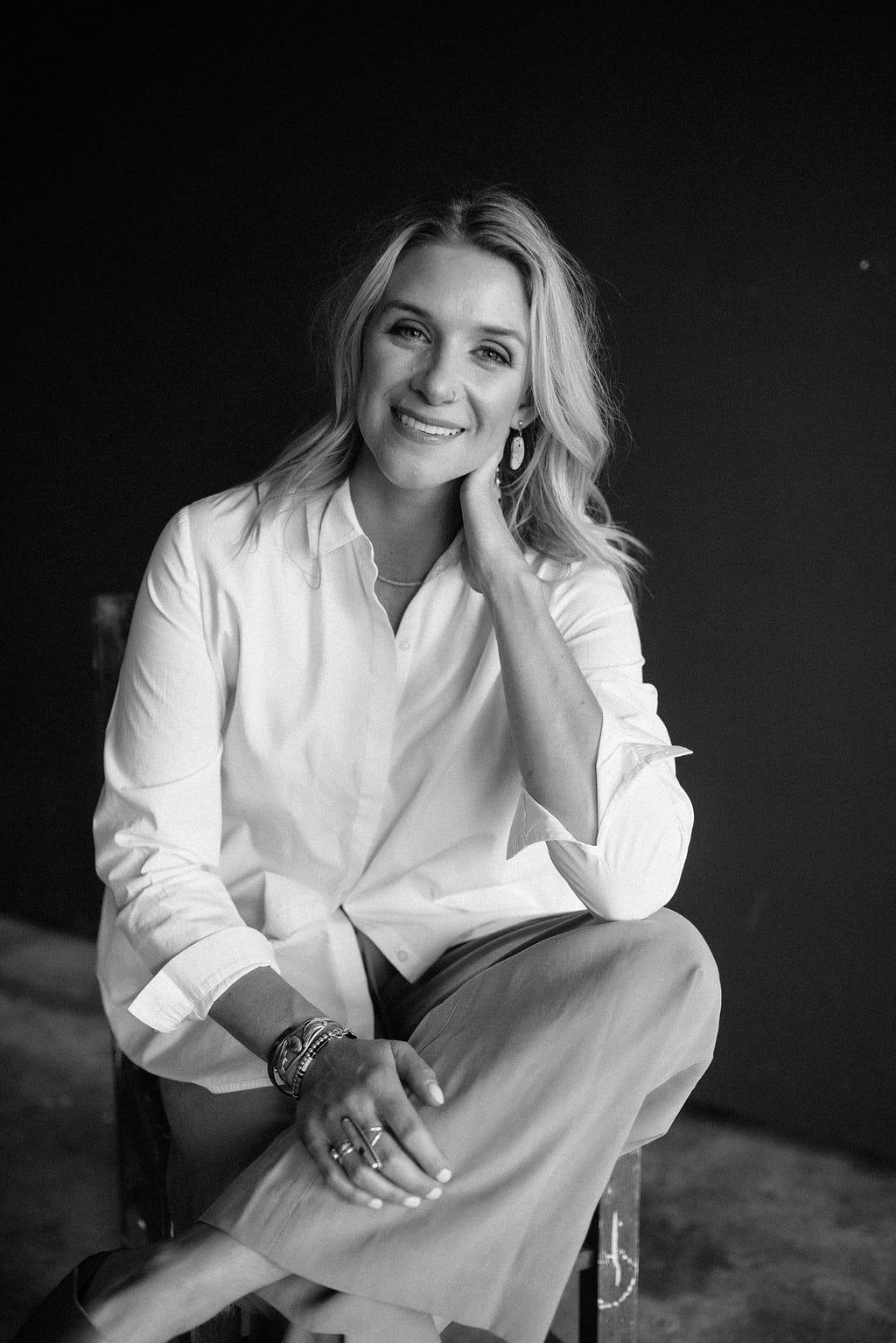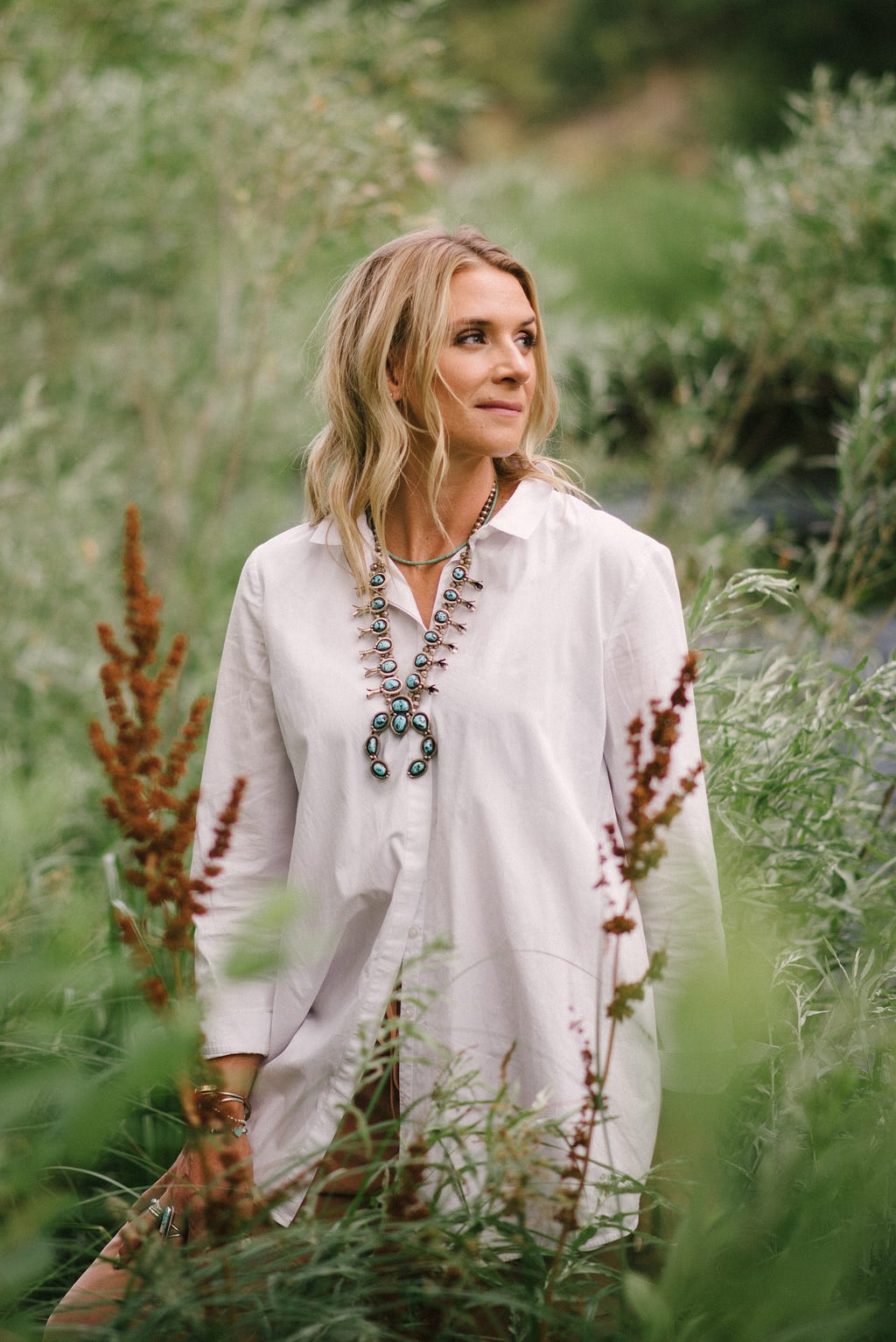
Don’t put all your eggs in one basket — Seek out multiple galleries, shows, and opportunities. Don’t rely on just one avenue. It’s essential to have your hands in many things to diversify and expand your reach.
As a part of our series about “5 Things I Wish Someone Told Me When I First Became An Artist” I had the pleasure of interviewing Maeve Eichelberger.
Maeve Eichelberger is a Colorado native, capturing both urban and rural lifestyles in her artwork. Passionate about collage, Maeve specializes in a new form of 3-dimensional collage. Using Plexiglass as a material for its modern, durable, and transparent qualities allows her to explore layers more deeply. “I create multiple layers of experience that demonstrate the significance of observing life sequentially and simultaneously.”
Maeve explores the many vitalities in the West via lifestyle, nature, and textiles. She intends to honor the many forms and history by creating a 3-dimensional interpretation infused with nostalgia and beauty of our ever-changing environment.
Thank you so much for doing this with us! Can you tell us the story of how you grew up?
I was raised in Denver, CO, where my father worked as an architect and my mother as a professor in Fashion Design and Creative Writing. At the age of 10, my family relocated south, establishing an unconventional farmstead. There, I nurtured chickens, turkeys, peacocks, goats, and horses. As a competitive swimmer, I graduated with an emphasis in art from the IB program in high school. My initial two years of high school were spent in Genova, Italy, culminating in my graduation in 2005. Subsequently, I moved to Philadelphia to attend Moore College of Art and Design. I spent a year studying abroad in Ireland and ultimately received a BFA from Regis University, where I currently teach.
Can you share a story with us about what brought you to this specific career path?
Had I not pursued a career in art, I might have ventured into the health sciences, likely as a veterinarian. From a young age, I struggled with reading and other skills crucial to our educational system. My parents tirelessly sought resources to help me catch up, and through dedicated tutoring, I eventually reached the same academic level as my peers. Although I had many supportive teachers, some doubted my capabilities, particularly in mathematics and test-taking. These discouragements nudged me away from the sciences and closer to art — a field I had been immersed in from a very young age and felt comfortable with.
Can you tell us the most interesting story that happened to you since you began your career?
Your text is well-written, but here are a few suggestions for improvement:
I would say my Western-themed art tells an interesting story. As a young girl, my family and I would spend every January attending the National Western Stock Show/Rodeo. We had distant relatives who were participants or ranchers, and every year, we would make a trip up to the gallery to see the Coors Western Art Show. Galleries were not new to me, as my parents were constantly taking me to openings, etc. However, I do remember the preciousness of that space at the Stock Show. Fast forward 20 years, and I applied to participate in the Coors Western Art Show 2014. To my surprise, Rose Fredrick took a chance on me and admitted me to the show. I sold out that year, and it’s been 10 years since. The connections, networks, and support I have gained from that single show, which had always been present in my life, still make an impact.
What are some of the most interesting or exciting projects you are working on now?
It’s been close to a year now that I have been thinking, sketching, and manifesting concepts about rivers. In the West, most people are aware of our water situation. As a young girl, it was drilled into me that we don’t waste water, we turn off taps when not using them, and we conserve water at all costs. I’ve been drawn to the water for as long as I can remember, and now is the time to give voice to it. I started fly fishing this summer, and I am hooked (no pun intended), but I really am in love with it. Having spent more time on the water, I am looking more closely, exploring the flora and fauna in and around it. I was just recently accepted to be a resident artist at the Denver Botanic Gardens, Land Line Residency program. I will be working closely with the researchers and botanists to develop a collection of drawings and photographs of the native and invasive species in the West and their effects on our water and land.
Who are some of the most interesting people you have interacted with? What was that like? Do you have any stories?
I love talking to people and hearing their stories, so I can honestly say that the majority of people I engage with genuinely interest me. In the art world, I’ve had the pleasure of meeting some fabulous artists, gallerists, curators, and directors. While there isn’t just one person or story that stands out, I can say that each individual I’ve encountered, regardless of their career position, is still human and experiences similar emotions to everyone else. Through these interactions, I’ve discovered the common thread of humanity.
Where do you draw inspiration from? Can you share a story about that?
I find inspiration in the sky, clouds, and the interplay of other objects and shapes that intersect with them. I’m drawn to the contrast of colors, shapes, forms, and textures. Growing up on a farm, I experienced vast open spaces. During my time in Miami, FL, pursuing my MFA, I lived on the beach, where the sky and ocean dominated my view. As a collage artist, I perceive the world both sequentially and simultaneously. My aim is to blend various elements to construct new environments imbued with nostalgia.
How have you used your success to bring goodness to the world?
I would like to believe so, but with my newest series, I feel I may be able to reach a broader audience. After all, we all need water and thus have daily interactions with it. My goal is to connect us through our shared relationship with water.

What are your “5 things I wish someone told me when I first started,” and why?
1. Take some business classes — As an artist entrepreneur, the creation of artwork is only a fraction of the business. The rest involves managing finances, marketing yourself, and conducting research.
2. Minor in marketing — While I’m happy with my minor in Religious Studies and Philosophy, having some basic business and marketing skills right out of school would have accelerated my business. I’ve taught myself everything through experience.
3. You will face as many rejections as acceptances — As an emerging artist, I’ve had to apply for shows, exhibitions, galleries, residencies, etc. With an ambitious mentality, I don’t let rejection deter me. Instead, I persevere and try again.
4. Not everyone will like your work, and that’s okay — Developing a thick skin and learning not to take things personally is crucial. It doesn’t matter if someone doesn’t like your work; what matters is using your voice and continuing to push past negativity.
5. Don’t put all your eggs in one basket — Seek out multiple galleries, shows, and opportunities. Don’t rely on just one avenue. It’s essential to have your hands in many things to diversify and expand your reach.
You are a person of great influence. If you could inspire a movement that would bring the most amount of good to the most amount of people, what would that be? You never know what your idea can trigger. 🙂
I believe that children are the light of the world. If we prioritize caring for children, we can cultivate kinder, more ambitious adults. While I’m uncertain about specific actions, I am passionate about involving and including children in innovation and conversations. Their unique perspective is often overlooked, but I believe that incorporating young voices can contribute to building a better world.
We have been blessed that some of the biggest names in Business, VC funding, Sports, and Entertainment read this column. Is there a person in the world, or in the US whom you would love to have a private breakfast or lunch with, and why? They just might see this.
David Hockney has always been a huge inspiration for me. I would like to listen to his ‘w.h.’ What is most important to his career, or himself as a person, as an artist. Ask him about the pool series, talk about water, and what it means to him.
What is the best way our readers can follow you on social media?
@maeveeichelbergerstudio
This was very inspiring. Thank you so much for joining us!
Maeve Eichelberger: 5 Things I Wish Someone Told Me When I First Became An Artist was originally published in Authority Magazine on Medium, where people are continuing the conversation by highlighting and responding to this story.
